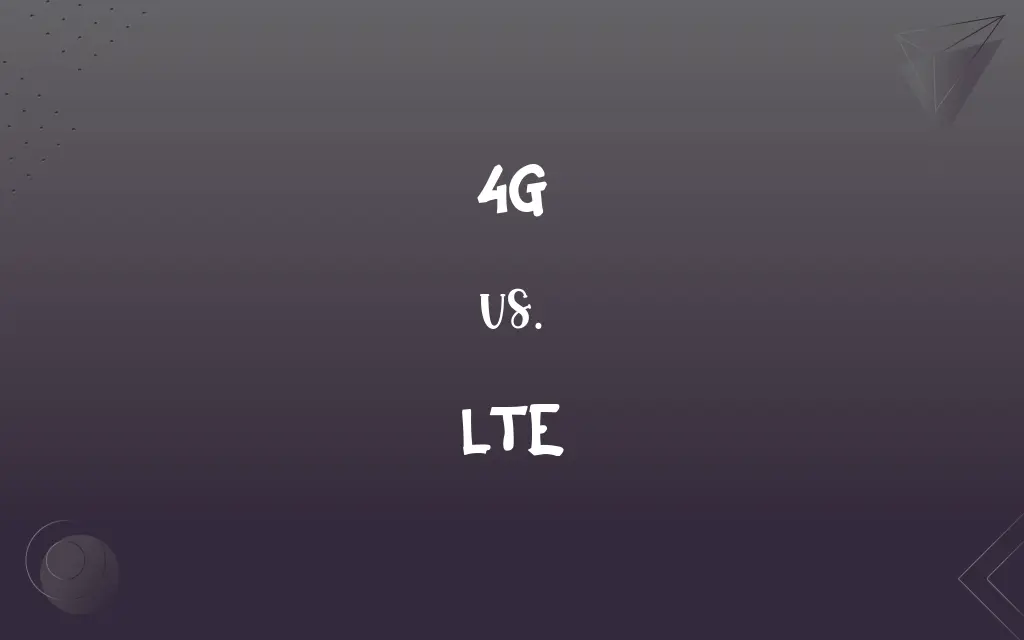4G vs. LTE: What's the Difference?
Edited by Aimie Carlson || By Harlon Moss || Updated on October 26, 2023
4G is the fourth generation of mobile network technology, while LTE (Long-Term Evolution) is a standard for 4G networks.

Key Differences
4G represents the fourth generation of mobile telecommunications technology, succeeding 3G. LTE, on the other hand, stands for Long-Term Evolution and is a standard developed to implement 4G speeds. The ambition behind 4G was to achieve faster and more reliable mobile broadband internet for smartphones and other devices. LTE was the pathway to reach these 4G ambitions.
Although 4G encompasses LTE, it's worth noting that not all 4G networks use the LTE standard. The primary goal of 4G was to achieve peak data rates of 100 Mbps for high mobility communication (like cars and trains) and 1 Gbps for stationary users. LTE, meanwhile, was developed to provide 10 times the speeds of 3G networks for mobile devices, ensuring smoother and more responsive internet experiences.
When consumers see "4G LTE" displayed on their devices, it indicates that they're using the LTE standard of the 4G network, which is currently the most common. It's a signal of both the generation of network (4G) and the standard being used (LTE). The evolution of LTE led to the development of LTE-Advanced (and later LTE-Advanced Pro), which were enhancements designed to further boost network speeds and efficiency within the 4G framework.
In essence, while 4G describes a generation of network technology aiming for specific data speed targets, LTE is the approach most commonly adopted to reach and often surpass those targets. The relationship between 4G and LTE is akin to that of a category and a specific member within it.
Comparison Chart
Definition
Fourth generation of mobile network technology.
Standard for 4G networks.
ADVERTISEMENT
Role
Represents a generation aiming for specific data speeds.
Approach to achieve and often exceed 4G data speeds.
Relationship
Broad category of network technology.
Subset or type within the 4G category.
Speed Targets
100 Mbps for high mobility, 1 Gbps for stationary users.
10 times the speeds of 3G networks.
Extensions
Includes other standards beyond LTE.
Evolved into LTE-Advanced and LTE-Advanced Pro.
4G and LTE Definitions
4G
4G is the successor to 3G in mobile network technology.
My phone just upgraded from 3G to 4G, and the difference in speed is noticeable.
ADVERTISEMENT
LTE
LTE aims for smoother and more responsive internet experiences.
Online gaming on my mobile became smoother thanks to LTE.
4G
4G encompasses a range of technologies, including LTE.
My carrier offers 4G services, some of which utilize the LTE standard.
LTE
LTE stands for Long-Term Evolution in mobile networks.
My smartphone supports LTE, making internet browsing faster.
4G
4G targets peak data rates for both moving and stationary users.
Even on a moving train, my 4G connection remains strong and fast.
LTE
LTE is a standard within the 4G network framework.
Most carriers label their networks as 4G LTE to specify the technology in use.
4G
4G aims for higher data speeds and more reliable internet.
With 4G, I can stream videos seamlessly without buffering.
LTE
LTE provides significantly increased speeds compared to 3G.
Since switching to LTE, my app downloads complete in seconds.
4G
4G is the fourth generation in mobile telecommunications.
As technology progressed, we moved from 2G to 3G, and now to 4G.
LTE
LTE has undergone advancements like LTE-Advanced.
The newer models of phones now support LTE-Advanced for even faster connections.
FAQs
Is 4G the same as LTE?
No, 4G is a generation of mobile tech, while LTE is a standard within 4G.
Why do some phones display "4G LTE"?
It indicates the device is using the LTE standard of the 4G network.
Which is faster, 3G or 4G?
4G is faster and provides a more reliable internet experience than 3G.
How does LTE compare to Wi-Fi?
LTE is a mobile network standard, while Wi-Fi is a local wireless connection. Speeds can vary based on many factors.
Is LTE available everywhere?
LTE coverage varies by carrier and region. Some areas might still rely on 3G.
Can I use LTE on any device?
Only devices designed for LTE can utilize its benefits.
Is 4G LTE secure?
While LTE has robust security features, no network is entirely immune to threats.
Are there technologies beyond LTE within 4G?
Yes, such as LTE-Advanced and LTE-Advanced Pro, which offer enhanced speeds.
Why was LTE developed?
To provide faster and more efficient mobile broadband internet.
Do I need a special SIM for LTE?
Some carriers might require an updated SIM to access LTE services.
Will 4G be replaced soon?
4G will eventually be succeeded by 5G, which offers even faster speeds and other benefits.
What does LTE-Advanced offer?
LTE-Advanced provides even faster speeds and greater network efficiency than standard LTE.
Why is my 4G connection sometimes slow?
Network congestion, location, and interference can affect 4G speeds, including LTE.
Are there different versions of 4G?
4G encompasses various standards, with LTE being the most prevalent.
Can I switch from LTE to another 4G standard?
Device and carrier compatibility determine the standards you can access.
Is there a significant cost difference between 3G and 4G?
Costs vary by carrier, but generally, 4G plans can be more expensive due to better services.
Does LTE improve call quality?
LTE can enable HD Voice, improving call clarity and quality.
Is LTE only related to internet speed?
Primarily, but it also improves network efficiency and responsiveness.
How does 5G relate to 4G and LTE?
5G is the next generation after 4G and offers advancements over both 4G and LTE.
Will LTE still be relevant with 5G around?
Yes, LTE will coexist with 5G for many years, serving areas and devices not yet 5G-ready.
About Author
Written by
Harlon MossHarlon is a seasoned quality moderator and accomplished content writer for Difference Wiki. An alumnus of the prestigious University of California, he earned his degree in Computer Science. Leveraging his academic background, Harlon brings a meticulous and informed perspective to his work, ensuring content accuracy and excellence.
Edited by
Aimie CarlsonAimie Carlson, holding a master's degree in English literature, is a fervent English language enthusiast. She lends her writing talents to Difference Wiki, a prominent website that specializes in comparisons, offering readers insightful analyses that both captivate and inform.































































